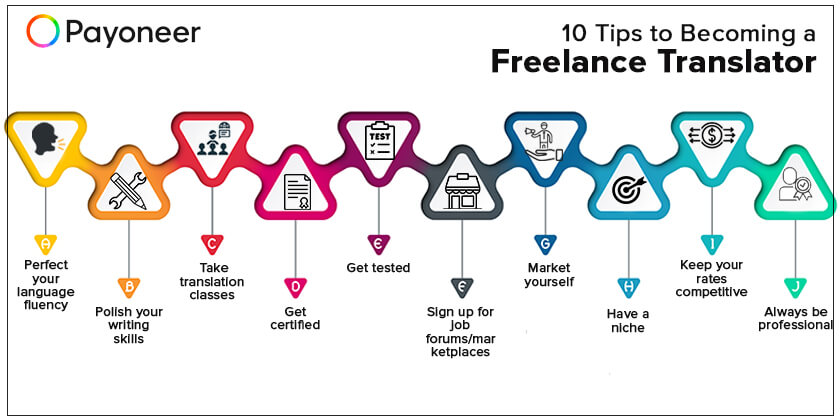
10 Tips to Becoming a Freelance Translator
Due to the ever-increasing trend towards globalization, translation services are growing. Widespread internet access and the e-commerce boom have both contributed significantly to the industry’s expansion, which Common Sense advisory predicts will reach revenues of $47.3 billion in 2015. There are approximately 640,000 translators in the world and if you’re fluent in more than one language and passionate about writing, translation could be a great career for you.


Check out our 10 tips to being a freelance translator:
1. Perfect your language fluency
To become a successful translator, you will need to be fluent in both the language you are translating from (the source language) and a native speaker of the one you are translating into (the target language)- that means formal dialogue to casual conversations, to esoteric terms about a variety of topics.
2. Polish your writing skills
Many aspiring translators think it’s enough to speak two languages decently to be a translator. Wrong. While comprehension of both languages is essential, your writing ability in the target language—what you’re translating a work into—is paramount. Practice writing in the language you’ll be translating into most often to develop a strong command of its grammar and style.
3. Take translation classes
Translation classes and programs provide students with the fundamentals of translation, practical experience in the actual translation of texts (in a wide variety of fields), and the opportunity to eventually become certified translators. Just like any professional, translation is a skill that needs regular polishing.
4. Get certified
Being certified by a national translators association will never be a negative…though it is not 100% necessary. Compensation surveys tell us that certified translators earn more than non-certified translators. Also, certification credentials provide tangible documentation that you have the skills required to translate or interpret professionally. Lots of people make lots of money without ever becoming certified; therefore, we consider certification a definite plus, but not a must.
5. Get tested
Take a language proficiency test such as the Defense Language Proficiency Test (DLPT) to show potential clients that you are indeed fluent in your specific language. Similar to an accreditation or certification, showing your test results to prospective employers is a quick way for them to assess your skills and see that you’ll be good for the job.
6. Sign up for job forums/marketplaces
Websites like Odesk, Freelancer, Proz and Translatorscafe have job postings for freelance translators in every language across the globe. Some are free and some require a fee – for the record, generally the ones that cost money are a bit more lucrative in the end. For more info on marketplaces check out: Top 50 Marketplaces Online.
7. Market yourself
Most translators are freelancers or contract workers, not employees. You’ll work on a project here, a project there, taking work as it comes and goes. Because of that, you need to market yourself everywhere and everywhere. For some tips on personal branding check out: 5 Tactics for Marketing Yourself as a Freelance Translator.
8. Have a niche
If you don’t understand the content or meaning of an original text, you probably aren’t going to produce a good translation. If you’re thinking about getting into translation, think about one or several areas of expertise that you have (something that you’re trained or experienced in) and aim for translation work in that specific area.
9. Keep your rates competitive
It is always a wise idea to keep an eye on your competition. While it may seem tempting to charge far below your competition in order to win jobs, doing so can actually brand your translation services as not being reputable. For more info on setting your rates, check out: The Complete Guide to Setting and Negotiating Freelance Rates.
10. Always be professional
Translators should know their linguistic limitations and decline assignments that go beyond their skills and competence. They should only accept assignments which they can complete and deliver in a timely manner. Lastly, translators are accountable for their work and need to recognize and acknowledge translation mistakes and try to rectify them even after the translation has been completed.
Do you have any tips or tricks to add to our list? Tell us in the comments below!




